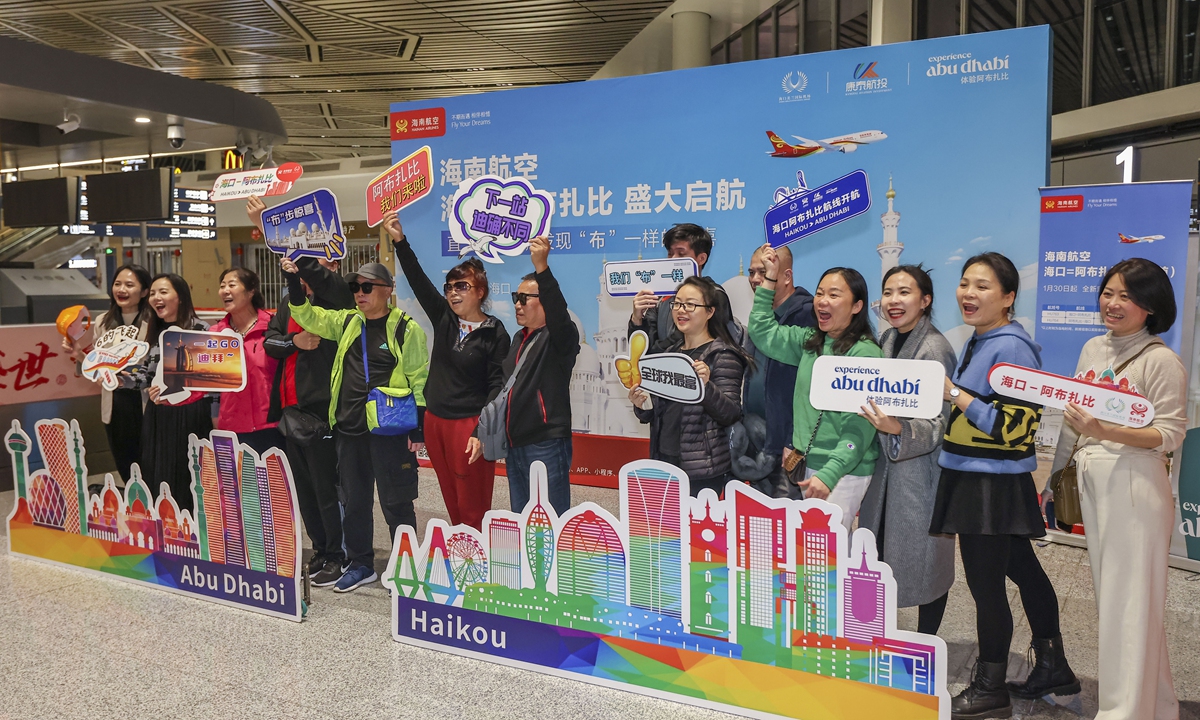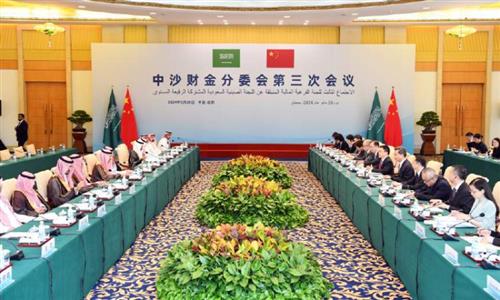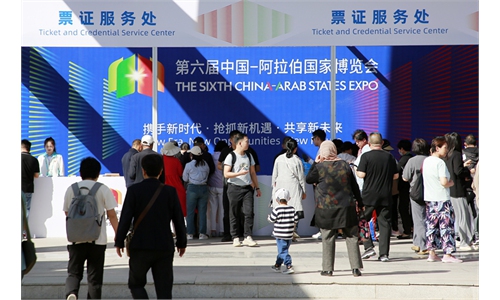
Passengers ready to board Hainan Airlines flight HU763 pose for a group photo before the plane leaves Haikou, capital of South China's Hainan Province for Abu Dhabi, United Arab Emirates on January 30, 2024. The route is Hainan's first air link with the UAE. Chinese airlines are mapping out more flights to cope with surging outbound travel demand, according to media reports. Photo: cnsphoto
From Tuesday to Saturday, heads of state from Bahrain, Egypt, Tunisia and the United Arab Emirates will pay state visits to China and attend the opening ceremony of the 10th Ministerial Conference of the China-Arab States Cooperation Forum, the Chinese Foreign Ministry said on Monday.The forum is expected to create new opportunities to deepen economic and trade ties between China and Arab countries. There is great potential in deepening ties in traditional energy, emerging industries, technology and financial cooperation, experts said.
The forum is of great significance in deepening economic and trade ties between China and Arab countries. There is a high degree of economic complementarity, Chen Fengying, an economist and former director of the Institute of World Economic Studies at the China Institutes of Contemporary International Relations, told the Global Times on Tuesday.
The Arab world has a demand for China's technology and market, while China has a demand for the energy resources of Arab countries, Chen said, noting the broad space and bright prospects for cooperation.
Niu Xinchun, executive director of the China-Arab Research Institute of Ningxia University, told the Global Times on Tuesday that cooperation in areas such as energy is expected to be strengthened through the forum.
Saudi energy firm Aramco Downstream President Mohammed Y. Al Qahtani told the Global Times in a note on Tuesday that China holds strategic importance for the growth of Aramco's businesses in Asia.
"In line with Saudi Vision 2030 as well as China's Belt and Road Initiative, we expect additional investments and an enhanced presence to meet the demand for refined products, chemicals and lubricants. This also includes entering into new partnerships in logistics, as well as procurement and supply chains, among other areas of investment," he said.
As the China-Arab relationship gets stronger, many areas of collaboration in emerging fields such as nuclear power, aviation, new energy, artificial intelligence and big data are also thriving. In recent years, we have also seen Arab countries expanding investments in certain emerging industries in China, Niu said.
As of the end of the first quarter, the Abu Dhabi Investment Authority held significant positions in 27 A-share companies, with a total market value of 11.29 billion yuan ($1.56 billion), an increase of more than 1 billion yuan from the end of 2023.
The Kuwait Investment Authority appeared in the top 10 list of shareholders in 30 A-share companies, with a total market value of 4.52 billion yuan, according to financial data provider Wind Information.
In the past three years, Arab capital has been mainly flowing into two key sectors in China - downstream industries related to traditional energy and emerging technology industries. These two sectors can be seen as the twin engines driving the economic transformation of Arab countries, Niu said.
Boosted by complementary needs, business cooperation between China and Arab countries is in full swing, with increasing collaboration and investment opportunities in various sectors.
At the 10th Arab-China Business Conference held in Saudi Arabia in June 2023, China and Arab countries signed 30 economic and trade agreements worth more than 70 billion yuan.
At the sixth China-Arab States Expo held in Yinchuan, capital of Northwest China's Ningxia Hui Autonomous Region in September 2023, the two sides reached 403 cooperation deals with a total value of 170.97 billion yuan, covering various fields such as modern agriculture, clean energy, healthcare, the digital economy and tourism cooperation.
Chen said that the two sides will deepen cooperation in developing electric vehicles and photovoltaic (PV) technology in desert areas, particularly in utilizing PV power generation and lithium battery technology as Arab countries seek a diversified energy supply.
Arab countries have capital and demand, while China possesses technology and research capabilities. The two sides can work together to engage in technical cooperation, joint research and development, and personnel exchanges to train professionals, Chen added.
China has become the largest trade partner of Arab countries, with bilateral trade increasing from $36.7 billion in 2004 to $398 billion in 2023. The stock of direct investment between China and Arab countries has exceeded $30 billion, the People's Daily reported.



